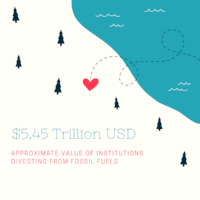Ethical Consumption in the News: May 2017
May was an interesting month for ethical consumption news. Some of the standard stories featured prominently: fossil fuel divestment is an increasingly potent force, while university groups have agitated for divestment of other kinds with less success (especially BDS and private prison divestment). But this month also featured the high-profile trial of a Toronto animal rights activist and the decision by Portland City Council to stop all corporate investment. This month’s ethical consumption news features the following stories: (1) a not guilty verdict was reached in the Toronto “pig trial”; (2) more cities and banks divested from Dakota Access; (3) an article evaluated the performance of organic agriculture; (4) Portland voted to end all corporate investment; (5) Divest Parliament grew in the UK; (6) private prison divestment, while still small, has been promoted at several high-ranking US universities; (7) the petroleum industry hit back on fossil fuel divestment; (8) more religious groups announced fossil fuel divestment; (9) crickets have entered Toronto’s food scene; (10) Sainsbury piloted a plan to drop Fairtrade; and (11) Pakistanis are boycotting Ramadan fruit price spikes.
1. Not Guilty Verdict in the Toronto “Pig Trial”.
Activist and founder of Toronto Pig Save, Anita Krajnc, was found not guilty of mischief. She had been charged after pouring water into the openings of a metal trailer, for the purpose of giving water to thirsty pigs awaiting slaughter, in June 2015. While the verdict has been viewed as a victory in the animal rights community, Judge David Harris explicitly rejected the argument that pigs are persons rather than property in his decision. Instead, the decision was based on a finding that Krajnc did not interfere with the lawful use of the pigs, since they were slaughtered.
2. More Cities Divest from Wells Fargo, Protesting Dakota Access Pipeline.
More banks and American cities are divesting from companies implicated in the Dakota Access Pipeline project. In February the Seattle City Council voted to divest from Wells Fargo, which is financing about 5% of the project. It was followed by San Francisco, as well as Davis and Santa Monica. However, this month Winona City Council voted to reject a similar motion. Several major European banks have dropped investment in the Dakota Access Pipeline project, as has one of the UK’s largest ethical fund managers (BMO Global Asset Management).
In Canada, the Treaty Alliance and a coalition of other Indigenous groups has launched a campaign to divest from financial institutions that fund oil pipelines.
3. Must Read: Evaluating the Performance of Organic Agriculture.
Is organic farming really better for producers, consumers, and the planet? New research by scientists at UBC suggests that the answer is context-dependent. Read the full academic article here, or check out a shorter and more reader-friendly summary published by Corporate Knights.
4. Portland to End All Corporate Investment.
Following pressure from activists promoting divestment from controversial companies, the Portland City Council voted to end all corporate investment. It is a move that would see the City move the $539 million that it presently has invested in corporations. One reason that Portland City Council is divesting from all corporations is “to avoid the trouble of having to perpetually decide which corporations the city considers bad actors,” according to the Oregonian. Portland will put its money into federal bonds and other non-corporate options. Notably, the Council acknowledges that it will lose money from this choice: $4.5 million annually, it is estimated.
5. Divest Parliament Gains Steam in the UK.
50 UK Members of Parliament have supported a movement called “Divest Parliament”, which is asking the Government to divest its £612m Parliamentary Contributory Pension Fund from fossil fuels. Among other arguments, the group contends that investments in BP and Shell are incompatible with the goals of the Paris Agreement.
6. Private Prison Divestment
The private prison divestment movement has gained traction amongst students in several US universities, including Harvard and Princeton University. However, neither university has opted to pledge divestment.
7. Divestment Debate: Petroleum Industry Hits Back.
The Independent Petroleum Association of America, a trade association representing oil and natural gas producers, commissioned a recently released report arguing that fossil fuel divestment will cause significant costs. They have since launched a website (here), in a move that is seen as a response to the actions undertaken worldwide as part of the Global Divestment Mobilization in early May.
8. More Religious Groups Divest from Fossil Fuels.
Previous Pullback articles have discussed the fact that faith groups make up the largest set of participants in fossil fuel divestment. In the spirit (get it? I’ll see myself out.) of the Global Divestment Mobilization, British Quakers announced 19 more divestment commitments. Nine Catholic organizations have done the same. The largest Muslim organization in the U.S., the Islamic Society of North America, will also divest from fossil fuels. And there have been calls for the Church of England to divest from ExxonMobil.
9. Crickets Enter Toronto’s Culinary Scene
Crickets are making an appearance in the Toronto culinary scene. There are now at least five places where you can eat crickets and other insects here in Toronto; in April restaurants across Ontario served insect dishes in celebration of Earth Day; and there will be cricket tacos, cricket-topped hotdogs, and beetle smoothies at this year’s CNE. Indeed, the world’s largest cricket farm is located in Ontario.
Entomophagy is the human use of insects as food, and it has been a common practice in some parts of the world for tens of thousands of years. Approximately 2 billion people today regularly eat insects. Insects have recently been promoted including by the UN Food and Agriculture Organization, as a sustainable substitute for meat-based proteins. They are much less greenhouse gas intensive to cultivate than other livestock, and require much less water. And raising crickets doesn’t take much space. However, given recent scientific findings about the learning abilities of other insects, does eating crickets pose an ethical challenge for someone that is vegetarian for animal rights reasons – especially since it involves killing vastly more animals per unit of protein?
Interested in learning more about entomophagy? Read Eat the Beetles!, a book by Canadian epidemiologist and veterinarian David Waltner-Toews.
10. Sainsbury in Hot Water over “Fairly Traded” Tea
Sainsbury’s, the UK’s second-largest grocery chain, has come under fire for dropping the Fairtrade Logo and instead piloting its own “Fairly Traded” mark on its own-branded tea.
11. Fruit Boycott Campaign in Pakistan.
Consumer rights groups in Karachi are urging consumers to boycott fruit for three days beginning on Friday 2 June. The boycott is in protest to rising prices during Ramadan.


